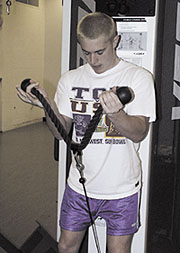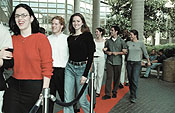By Natascha Terc staff reporter Students like senior Letryce Henry are reaching deeper into their pockets to keep their cars gassed up as oil prices continue to rise. "Gas prices are ridiculous," said Henry, a radio-TV-film major. "You can't get half a tank for $5 anymore." The increase in price stems from the reduction of the crude oil supply by the Organization of Petroleum Exporting Countries and several other countries last March, said John Cook, petroleum division director, in his statement before the U.S. Senate in February. The prices are expected to increase through July, when they will peak and then begin to decline. Henry said she is angry because she needs more money for gas now, and she has less for leisure spending.
Unleaded gasoline prices for the Dallas/Fort Worth area that were less than $1 until March 1999 are now around $1.46. James Gifford, a sophomore business major, said he just pays the higher gas prices because there is nothing he can do about it. "I live on campus, but I drive 30 minutes to work," Gifford said. "I drive a big truck, and it's costing me $30 for less than a full tank." Melanie Kirkland, a senior history major who works for the Union Pacific Resources oil company, said she does not mind the increase in gas prices. "I have stock in oil at my company," Kirkland said. "When oil prices go up, the value of my stocks goes up." Kirkland, 36, said she remembers the effect the oil prices had on the Texas economy in the 1980s. "So much of the economy in Texas is tied to the oil prices," Kirkland said. "In the 1980s, when there was a crash in the oil prices, the economy went down the tubes." Kirkland said although she is not complaining about gas prices, she said she sympathizes with students who have lower incomes. "I may change my mind when my daughter starts driving in August," Kirkland said. David Murley, an instructor in the TCU computer science department who lives in Weatherford, said gas prices do not affect him as much as they do his son who is on a limited allowance. "To me, it's more of an irritant than anything else," Murley said. "But I can see how if you were on a tight budget the extra $5 or $10 would make a difference."
"One good thing that's come out of this is that my son is more careful about getting his chores done so he can earn his allowance," Murley said. "He desperately needs the money for gas." Samantha Jordan, communications director for Congressman Joe Barton, said Barton's office is not receiving many complaints about the gas prices. "We heard more when gas prices were really low because it hurt oil producers in Texas," Jordan said. Jordan said Barton, the chairman on the House Subcommittee on Energy and Power, will meet with the committee this month to examine the price effects on various parts of the country. Lonnie Fletcher, a cashier at the Texaco station at Hulen and Loop 820, said she hears people talk about the gas prices every day. "Everybody has a comment about it," Fletcher said. "But I don't think it's slowed them down any." Supporters of a "Gas Out" on April 7 through 9 are urging the public in the United States and Canada to avoid buying gasoline on those days to encourage an increase in oil production. "I don't think the gas-out will make a particular difference in our business," Fletcher said. "It's like cigarettes. Companies raised the prices, but consumers aren't swayed."
Natascha Terc
By Kathryn Garcia staff reporter With a couple of days left until Spring Break, some students have spent the past week at the Rickel Building and at tanning salons to prepare for the week-long vacation. Susan O'Dell, a bed cleaner at Planet Beach Tanning Salon said her business experienced at least a 50 percent increase in customers before Spring Break. "A lot of students come right before Spring Break so they can look good in their bathing suits on the beach," O'Dell said. Lauren McDonald, a freshman premajor, said she has been preparing for her trip to Panama City, Fla., for two weeks. "I've been hitting the tanning salons," McDonald said. "I don't want to go to the beach and scare people with my white body."
"My friends have been working out constantly at the Rickel and watching what they eat for the past few weeks," she said. Recreational Sports Building Manager Jessica Brooks said this time of the year, from January until Spring Break, is the busiest. "This week we've had a huge increase of people," she said. "Mostly the men use the weight room, and the women do the cardio exercises." But Brooks, who is a junior social work major, said coming the week before doesn't normally prove beneficial. "The ones that make an effort and come to work out long before Spring Break see (a change)," she said. Erin Anderson, a sophomore psychology major, said she has started going to the Rickel this week to prepare herself for a ski trip to Woodland Park, Colo., with her boyfriend. "I started playing racquetball and running just because I know it will take a lot out of me," she said. "Hopefully, it will take some of the sting out." Lynn Glienke, a sophomore movement science major, said she is going camping in East Texas for Spring Break to treat herself because she's been studying all week for four tests. "There is not a store within 30 minutes," she said. "I am going to sleep a lot, read a lot and play in the river." Dan Hunt, director of university relations at Horned Frog Travel, said the most popular Spring Break destination is Cancun, Mexico. "The Mexican destinations are easily the most popular," he said. "The most popular domestic destination would have to be Padre Island." McDonald said her first choice was Mexico, but it was filling up fast and was much more expensive than their final choice, Panama City. Hunt said other popular places to visit are Daytona Beach, Fla., and ski areas. Mark Friedberger, an adjunct professor in the history department, said he holds a small contest to encourage his students to go far away. He said the person who travels the farthest wins a how-to book - called A Student's Guide to History - that helps students with writing papers. "People like to enjoy themselves by going to exotic places," he said. "(The contest) drums up interest in the class, and the book is helpful for history classes." LeeAnne Parsons, a freshman radio-TV-film major, said she has been counting down the minutes to her trip with Christ Chapel Young Life to Costa Rica. "Today already feels like Friday, and it's only Wednesday," she said. Parsons said not only will she get to enjoy herself at the beach, but she'll be helping others at the same time. "We're building a Young Life camp on the coast for Costa Ricans," she said. "And in the afternoons, we'll lounge around the beach." McDonald said she cannot wait for Friday, so she and her friends can start their drive to Florida. "This is the slowest week of my life," she said.
Kathryn Garcia
Students, staff offer tips for safe Spring Break By Courtney Roach staff reporter The thought of heading off to Spring Break usually provokes daydreams of sunny days on the beach, skiing down a mountain or exploring big cities. What some students do not think about, however, are the unforeseen dangers such as alcohol poisoning, sunburns, falling asleep at the wheel or even getting arrested. John Pomykal, a sophomore finance major, said he just got out of trouble with the law and is not looking for more during his trip to Panama City, Fla. "Honestly, my biggest safety concern is getting thrown in jail," Pomykal said. Angela Taylor, the director of the Alcohol and Drug Education Center, said Spring Break is a vulnerable time for some students because all they are thinking about is partying. She said many people prey on Spring Breakers who are only at the destination for a week or less. "My top four safety concerns for Spring Break would be binge drinking, driving drunk, unprotected sex and predatory drugs like Rohypnol and GHB," Taylor said. Taylor said she understands a lot of people are going to drink over Spring Break, so she recommended they commit themselves to a plan, such as six drinks a day. Carolyn Barton, a freshman English and business major, said she and four friends are heading to Port Aransas to lie on the beach. "My biggest concern, really, is the Texas Alcoholic Beverage Commission because I don't want anyone to get into trouble," Barton said. Taylor cited a study from Rolling Stone magazine last year regarding underage drinking and disorderly conduct fines in South Padre Island. According to the study, South Padre hired 30 additional police officers during Spring Break last year, and fines for underage drinking and disorderly conduct increased. A $143.25 fine was given to those drinking who were under 21 years of age. A fine for disorderly conduct was around $200. Taylor said she does not expect those numbers to be much different this year. Too much sun is also a problem, said Suzanne Lockwood, an instructor in the Harris College of Nursing. She said she has a few tips for preventing sunburns. "People should use a minimum of 15 SPF whether they are at the mountains or the beach and should apply it a half hour before going into the sun, so the skin has time to absorb it," Lockwood said. Lockwood also said students should not drink alcohol in the sun because it dehydrates and intensifies UV rays, causing the skin to burn faster. Breanne Bouma, a sophomore education major, said her safety concern is not at the destination, but in getting there. "My biggest concern is falling asleep at the wheel, since I'm driving home and will be tired from all the tests," Bouma said. Texas A&M University students have created a solution that may alleviate driving problems called the Lupe Medina Program, named after an A&M student who died in a drowsy-driving accident. The program allows any college student to get discounted rates at 58 motels in nine states when they are driving late at night or are drowsy. The discounted rate is $30 per night and is offered to students who are traveling at least 55 miles from their home campus. Taylor also warned women and men to stay in control so that no one can take advantage of them. "Know who you're going out and coming home with, so you're not left to your own devices," she said. Taylor said she hopes people try to be responsible and not get so drunk that they do not know what they are doing. She said her No. 1 tip is pretty simple: "Look out after your friends."
Courtney Roach
By Rusty Simmons staff reporter Amy Lagat, a sophomore Latin American studies major, tentatively stepped over the red carpet leading to the Moudy Building South, dodged a couple of cameras and entered through a different door. Then, as she entered the green room, Lagat stopped for a glass of punch and a Butterfinger. Almost 100 students noticed the grand entrance setup on Wednesday before packing into the 82-seat auditorium to view the first of a 10-episode, student-produced soap opera, "Studio 13." Those involved with the production of "Studio 13" said they wished the ambiance surrounding the premiere would continue for the remaining episodes. "We really think it is a big deal," said Courtney Robinson, who plays Lynda North in "Studio 13." "Hopefully, the red carpet and everything made the audience think the same thing."
"It was a lot better than I expected," he said. "I liked the humorous parts. I would watch more soaps if they included a more humorous side." Richard Allen, faculty adviser for "Studio 13" and a writer for the CBS soap opera, "As the World Turns," said humor helps to keep the audience in support of the characters. "The audience's laughing reactions showed they liked the characters," he said. "It also shows a lot of the writing class' slant on the soap opera." Mustafa Zaveri, a freshman radio-TV-film major, said he didn't know what to expect, but he thought it was a good effort by the students. Lagat said she was planning on coming back to watch the other episodes. "I've seen some student-produced projects in the past, and this one was a lot better than I expected," she said. Allen said the projects get better each time the department produces one. The premiere was a character-building episode, and the plot plays out more in future shows, Robinson said. The remaining nine episodes will be shown at noon every Wednesday beginning after Spring Break in Moudy Building South, Room 164.
Rusty Simmons |
| The TCU Daily Skiff © 1998, 1999 Credits |
 "The extra money I have for partying with I now have
to use toward gas," she said.
"The extra money I have for partying with I now have
to use toward gas," she said. However, McDonald said her friends have
been taking a different approach on preparing for Panama City.
However, McDonald said her friends have
been taking a different approach on preparing for Panama City. Although audience members said it was impossible to miss
the majestic entrance, they mentioned some of the on-screen occurrences
even more. Regan Vermillion, a junior history major, said he usually doesn't
watch soap operas.
Although audience members said it was impossible to miss
the majestic entrance, they mentioned some of the on-screen occurrences
even more. Regan Vermillion, a junior history major, said he usually doesn't
watch soap operas.